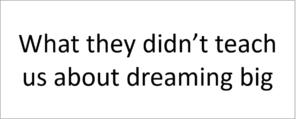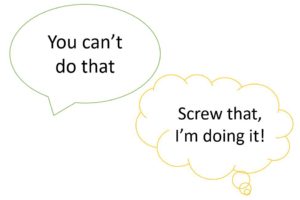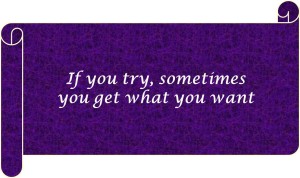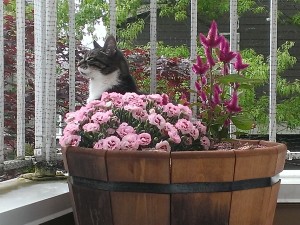Tag: living well
Dream Big, They Said
 Remember when we were little kids and we were told we could do anything we set our minds to? We heard it mostly in grade school, but also in after-school programs and from parents.
Remember when we were little kids and we were told we could do anything we set our minds to? We heard it mostly in grade school, but also in after-school programs and from parents.
We were told inspiring accounts of people who achieved great things. We learned of career options from astronaut to president and told we could have those jobs. We were taught about Mother Theresa and Martin Luther King Jr and told we too could do big work with a big impact that helped many people.
We were told to dream and work hard. We could do great things in our lives. We just had to make up our minds and go for it.
Teachers and the others – they can’t very well NOT say those things. Where would we be if we hadn’t been told to have dreams and try to reach them?
I wish, though, that we had been taught what to do when things go wrong in our pursuit of our big dreams. And what to do when life squishes our dreams before we even really attempt to achieve them.
I think it happens as early as high school – when we trade in our grand ideas for more practical matters. Our awareness grows. We understand what we hear on the news and its implications in our own lives…jobs and joblessness, natural disasters, war…
There are also timelines to consider. Preparing for the first job out of high school, or attempting to get into college and then deciding what to study. And then graduating and needing a job and a place to live.
After college I wasn’t dreaming much. I enjoyed my life and dove into the beginning of my career, but looking back, I can say my dreams were replaced by goals.
And my goals – at least the biggest two that I accomplished in my adult life so far – didn’t even come from a strong desire within myself to achieve something meaningful.
Instead, they were inspired by obstinacy.
It is true that since college, if not earlier, I vaguely expected to get an advanced degree at some point in my life. However, it wasn’t until I was rejected from a year-long marketing certificate program that I was motivated to get an MBA. My exact thinking was, “Seriously, I was turned down for a certificate? Screw them, I’m getting a master’s degree.” Some rigorous GMAT prep and five years of school later, I had my degree. Ultimately, I was glad I was refused participation in the certificate because it turned out to be a fraction of what I wanted to learn and was capable of achieving.
 My second example is only slightly different, in that I hadn’t thought about home ownership as a goal at all. I was about to give up my apartment to move to another place with someone when circumstances changed and obstinacy kicked in again.
My second example is only slightly different, in that I hadn’t thought about home ownership as a goal at all. I was about to give up my apartment to move to another place with someone when circumstances changed and obstinacy kicked in again.
I decided I would make housing plans on my own and buy a place instead of renting. I made a budget in excel, put as much as I could into the down payment and fees, and then I owned a home.
I didn’t need to learn to use rejection and setbacks as motivation but I think it should be taught. I hear too many stories from older writers and artists who put down their pens when they were young adults because somebody told them they weren’t talented. It seems like it would be a very useful lesson plan to prepare kids for when they are told no, they can’t, they aren’t good enough, to muster a “screw you” attitude and pursue their art anyway.
Another skill that I wish I had been taught in school is how to channel disappointment into something useful. I get depressed by civic issues of inequity and discrimination and need more than the grade school equivalent of a lemonade stand that raises money for these causes. My stabs at educating myself, speaking up, and seeking out groups to participate in seem the right steps for now, but I was floundering for a long time.
The lemonade stand fundraiser is great to show little kids that they can take initiative and tangibly provide support for causes. But then the cups are put away, the money is donated, and life goes on. What’s missing is sustained effort, and follow-up to see what impact was made. An analysis to determine what about the effort was successful and what can be done to improve. Or how to translate lessons learned into the next effort.
Some of my good friends share this sense of civic-work malaise. We have a sense of being pushed to put our skills and experience to better use. Even people who are working in non-profits or who are on the board of multiple civic groups are unsettled and feel there is more they should be doing. There is a limit to how many action committees a person can reasonably join, so it seems failure to achieve the desired impact is the problem. We’re falling short of our big dreams to make a big impact.
Wouldn’t it be great if we were taught throughout school how to be patient and sustain efforts over a long period of time, even when we don’t see the results we want? I remember being taught about Abe Lincoln’s personal and professional setbacks before he became president. He had business debts that took years to pay off, was a self-taught lawyer, and lost his first attempt to win an Illinois state legislative position.
What isn’t clear is what motivated him to keep pursuing his dreams.
I wonder if he was driven by a belief that he had something to offer people. Maybe he resolved to keep trying, and to look for ways to use his abilities to be of service.
What we do know is that he said yes to opportunities. Clearly he didn’t let fear of failure prevent him from going into business, becoming an attorney, or running for public office. After each misstep, he came back with resilience. Whatever doubts he might have had about his abilities to perform in those professions didn’t stop him from showing up and doing his work.
I didn’t learn these things in school, although I wish I had.
I’ll keep using obstinacy as fuel when people tell me I can’t do something I want to do. I’ll try to be patient with setbacks and keep ahold of my belief that I have something to offer, even when I don’t see progress.
You too, ok? When someone tells you no, go ahead and prove them wrong.
And keep the faith. You’ve got something to offer.
Give Yourself a Break
If you’ve set goals or made plans and haven’t exactly followed through on them, give yourself a break. Beating yourself up isn’t going to deliver your achievement.
There are all kinds of reasons why progress slows down and sometimes comes to a stop. Maybe your immune system is lowered by the cold and flu season or because of extra stress in your life. Maybe you’re going through a challenge or transition and you have less energy than normal.
You could power through the fatigue and stress – for a while. Eventually your body will overrule your ambition and you’ll find yourself with less energy and strength than you had in the first place.
Instead of blaming yourself for not powering through your body’s requirement for rest, you could choose to accept it. It is only a temporary phase, after all. You could choose to acknowledge what is happening: “I am tired and have less energy. I need extra rest.” Then, you could allow yourself a break while you regain your strength.
This is not laziness. It is demonstrating self-awareness and self-value by placing your health among your highest priorities.
You may have created a deadline in your mind, or hoped for an achievement by a certain timeline. However, your body has its own reactions to your external environment, and its own ways of gauging what your mental, physical and emotional status is.
As a personal example, early this autumn I hired an editor to refine my manuscript. When she sent back her recommendations, I was excited and planned to finally finish my book within a month. Then my cat died, my business demanded extra attention and I had unexpected stressful events to deal with.
I wanted to work on my book. I’m so far past the time when I thought it would be published that I’m embarrassed when people ask me if it is available for purchase yet. Despite my wants and my ego, I decided to listen to my body when it told me I needed a break. I cut back on my obligations, slept a lot more, and stopped thinking about my book.
Two and a half months went by – not my ego’s timeline, but my body’s. Then I was ready to pick up my manuscript again.
As it turns out, putting it aside for a while made editing easier than in the past. I looked at my writing with a fresh perspective. I came up with a method of giving myself a small editing assignment each day that followed the same pattern. I keep a running list of each assignment on a piece of notebook paper and write “done” next to each task when I’m finished. Then I jot down the next assignment.
I wonder how much better my editing is now than if I had tried to force myself to do it when my mind and my energy weren’t ready?
I hope that you are full of good health and making progress in the areas of your life that make you happy. If not, maybe it is time for a break. A break without self-judgment or letting your ego make you feel disappointed. Maybe it is time for a healthy, restful break that you will emerge from better than ever.
The Success Stories We Don’t Read About
My friend sent me this link to a Malcolm Gladwell article that discussed the differences between early geniuses and late bloomers. It is nice to see a nod to the people who have worked hard at their professions for many years, and finally attain the level of success they dreamed of.
I liked this article. I also think that the media’s love of the big success stories leaves out a lot of inspiring people.
There are other ways of looking at career success beyond the young genius and the older achiever. Some people might be successful in multiple parts of their work life from youth to old age.
That success might be in the form of earning millions of dollars, or by introducing a product or service that positively impacts a large group of people. The success might be satisfaction from achieving a high level of skill in topics they are passionate about. Maybe it is pride in taking a career risk that improved the quality of their lives. It might be a feeling of contentment from diligently pursuing work that allows them to support family members.
I would like to read inspiring news stories that feature the success of people who do well but aren’t famous and didn’t generate top hits in their fields.
Thinking about success more broadly leaves room for people that have patchwork careers or successive careers in different areas. Without a single-minded focus they probably won’t be among the highest level of experts in a field and may or may not have a lot of earnings, but they amass a breadth of knowledge and skills and may be successful in many other ways.
So here’s a shout out to all the people who work hard to achieve their own definition of success. Cheers to your achievements!
You really can go after what you want in life and get it
 This evening as I was leaving my client’s office, I ran into a friend that I hadn’t seen for a few years. She asked how my life has been since I quit my job in the summer of 2013. I gave her the highlights of going to the Jack Kerouac School for a month of writing classes, starting a business that didn’t work out and then doing consulting work and realizing I love it.
This evening as I was leaving my client’s office, I ran into a friend that I hadn’t seen for a few years. She asked how my life has been since I quit my job in the summer of 2013. I gave her the highlights of going to the Jack Kerouac School for a month of writing classes, starting a business that didn’t work out and then doing consulting work and realizing I love it.
She expressed how glad she was that my career has gone well for me in the last year and a half and I was touched that she was happy for me. She said something else, though, that made a big impression. She said, “You are proof that people really can go after what they want in life and get it.”
My career isn’t perfect. Finding great clients can take time and be nerve wracking. Running my own business comes with a whole set of accounting tasks, licensing and taxes that I didn’t have to deal with when I was a full time employee.
And yet.
I went after what I wanted in my work life and got it. More flexibility and autonomy. Less bureaucracy. More enjoyment of my day-to-day work life. Less stress. More opportunities to use my skills set and keep learning.
You really can go after what you want in life and get it.
Something Beautiful to Look At
 Last spring I planted flowers in the pots in my backyard. Nothing extravagant. There were Bougainvillea, Chrysanthemums, and some filler plants that I don’t know the names of and that I hoped would live through the heat, the shade, the bugs and the squirrels that always want to hide their peanuts in those planters.
Last spring I planted flowers in the pots in my backyard. Nothing extravagant. There were Bougainvillea, Chrysanthemums, and some filler plants that I don’t know the names of and that I hoped would live through the heat, the shade, the bugs and the squirrels that always want to hide their peanuts in those planters.
Every time I walked past my back door, I saw the flowers in their pots and felt a rush of happiness. It was like looking at the beautiful flowers gave me a boost of positive energy.
I noticed this feeling again when I had wrapped Christmas presents for my family and set them under my little fake tree on a cabinet. Every time I walked past the cabinet I thought the presents looked so pretty sitting there, and I felt more cheerful. I’m no expert with wrapping paper, and don’t go wild with Christmas decorations. In fact I didn’t put a single ornament on that tree, but the presents made it pretty enough.
It made me think about how useful it is to have something beautiful to look at throughout the day. It adds a little spark of happiness that stays with me and brightens my day.
It also made me wonder why I don’t get the same boost of happiness when I look at the things that are more permanently in my house – paintings, the cheerful yellow bedspread that took me months to pick out, or my grandmother’s chandelier. Well, the chandelier makes me feel good because it reminds me of my grandmother and her unique taste. Turquoise blue painted over brass! But that is a different kind of beautiful that comes from family love.
I realize that part of the joy of looking at something beautiful is its temporary nature. The flowers die and nothing much grows in the backyard until it is warm again in spring. I enjoyed looking at the wrapped presents because a few days later my family unwrapped my handiwork. I asked them to “sufficiently admire the packages before opening them!”
The flowers and wrapped packages don’t last long enough for me to get used to them like I do with my paintings and bedspread.
So now that I am without flowers on the deck, and have no pretty presents to look at, I am making an extra effort to notice any pretty thing that I see while I’m out for a walk, or in a store, or if I catch a glimpse of a bluebird that sometimes rests on a branch outside my office window.
Little beautiful things to look at to brighten my day.
You Don’t Need Permission to Rest
You don’t need permission to rest.
You don’t need permission from someone else to take a break. You don’t need to wait for your boss, your spouse or your friends to tell you that you are allowed to have some time to take care of yourself.
You don’t have to earn your right to rest. It is a human need. Remember that babies sleep a lot and nobody questions whether they deserve it.
Self-care is a buzzword lately, but what exactly does that mean? There is no self-care prescription, such as “soak in a bubble bath one hour before bed.” Maybe you hate baths or don’t even have a bathtub.
Only you know what will give you the rest and rejuvenation that you need. For some people that might be getting an extra hour or two of sleep each night for the next few months. For others, it could be taking walks every day. Different people might make a point to go to the gym, get acupuncture, spend more time with friends, or spend more time alone. If you don’t know what you need, start by asking yourself “What is the kindest thing I can do for myself today?”
If you’re overworked, burned out, sick, stressed or need a break from coworkers and family, take it. If other people are counting on your participation in certain activities, negotiate up front. Agree to deliver the presentation your manager wants by the end of the day, and then be clear that you won’t be online or checking mail for the next week while you’re out on vacation. Tell your friends you’ll meet them for dinner but need to leave the restaurant by 8PM. Participate and enjoy the people you’re with with you’re with them. Then leave the office or the dinner with friends when you’re tired.
If there are household chores to do, or extended family staying at your house for an extended period of time, agree upfront what will be done when, and by whom. Then let everyone know when you’ll be out of the house to go exercise, or that you need two hours of alone time to nap in your room.
Whatever it is that you need to shed stress and fatigue, do it. You don’t need permission to rest.
Taking a Break
Today is a milestone: I sent my manuscript off to an editor! After a year of starts and stops, this is a big step forward. Clink, let’s raise a glass to that understatement!
Of course once the editor sends it back in a few weeks, I will still have work to do. I will go through her recommendations, add, delete, rewrite and do another round of polishing.
But while the editor is working, it is best that I’m not. Otherwise we could get into a version control nightmare. I am happy to avoid that!
So what to do with three weeks? It would be prudent to use this time to write my book proposal. It’s a huge task, and one that I’ve been dreading. Or I could work on the twenty-minute talk I’m preparing to give to small groups, to start drumming up an audience of future readers and happy job quitters.
Should I?
Nah.
I’m going to take a break. I’ve been working nearly every single day, weekends included, on my consulting business, book, blog or all three and think my perspective is narrowing. I want to put all my work aside and shut off from technology as much as possible. PC closed, phone silenced, tv off. Well, the tv is a gimme since I rarely watch it anyway.
This is my chance to turn off the usual noise my head and see what else I might like to think or feel or deal with.
Since early August, I’ve been taking a class that focuses on interpersonal awareness and managing relationships. It is turning out to be heavier than I anticipated. Not that I was expecting a class on these topics to be lighthearted fun, but c’mon, I’ve participated in so many of these types of workshop already! I went into it thinking this class would be remedial, a piece of cake. More like humble pie!
Sigh. I guess there’s always more to learn and process.
So this is a great time to take a tech break. I’ll focus on getting as much as possible from my class. I’ll spend more time outside, read and try to relax.
I’ll be back with a new post mid-September, and hopefully with a clearer head, a fresh perspective, a tightly edited manuscript, and much to report back on. See you then!
Stepping Off the Treadmill of Ambition
I keep getting emails from Scott Dinsmore with his rallying cry question of “Are you all-in?”
No, I’m not. And I’m fine with that.
I’m editing and fine-tuning my book that I’m committed to publishing. I’m using a chunk of my savings and evenings working through a checklist of tasks to move my startup business forward. I’m spending the majority of my daytime hours on a consulting gig that I recently started, and am devoting energy into delivering top quality results for my client. I started this blog and a professional Facebook page to share my interest in the topic of meaningful work and connect with other people who want to live closer to their values. But I’m not all-in on any of this.
I’m not giving up my sleep, health, or social life because I put a higher value on my day-to-day happiness than launching my startup business faster. I’m not scheduling every half-hour of my week to maximize my productivity because it’s more important to me to have a certain amount of unstructured time. I’m not launching a professional Twitter account because I’d rather unplug from technology when I need a break and I don’t want to feel obligated to respond to tweets every few hours.
Maybe at some point I will turn more attention to these areas of my life, ramping up the hours and energy I spend on them. I might choose to be more active on social media to grow my businesses. Or I might let some activities go so that I can dedicate more effort to my highest priorities. But right now, my soul is guiding me to be a little easier on myself.
For most of my life my M.O. for success was to go all-in on every project I felt responsible for. I powered through when I was tired, sick, and when I’d rather be doing something else. This way of living started in high school, when I stayed up until 3AM if that’s what it took to complete a school project that was due the next day. Nobody encouraged me to do this – I felt compelled to turn in good assignments on time, in the same way that in my later working years I made sure that my deliverables met my bar of quality and met my deadlines.
Looking back at my career, I certainly produced a lot. When I think of the sheer volume of programs, projects, presentations, and materials that I generated in any given year, I feel more surprised than proud, because it seems like I delivered an unrealistic workload. Which is part of the problem that I’ve read and heard about so much in my book research – and I didn’t have to look very far to find it. Company employees are continuously being asked to do more with less. Layoffs happen, budgets are reduced, and the remaining employees don’t just pick up the slack – they work to continue to grow the business. Just today I had a conversation with a woman who often works until 10PM because she’s responsible for the equivalent of two full-time jobs. Like many of us, she feels compelled to give it her best effort, but she also acknowledges that it’s not how she wants to live her life.
When I lived this way it felt like I was plugged into a corporate machine. I was running on adrenaline and there was no way to shut it off. I went from working a bunch of hours in a stress-filled office to coming home late and tuning out until it was time to sleep. And I needed a lot of sleep to be able to get through the days. I know not everyone operates like this, and there are people who can leave work at work, or check out and stop caring, or find other ways to cope. I saw it all: people coping with prescription meds, booze, drugs, or by acting out.
I didn’t want to just cope; I wanted to enjoy my life every day. When I quit my job, I stepped off the treadmill. Life slowed down so much that it was a shocking adjustment to have plenty of energy and many more hours in each day than what was required to work on my book and new business. When you’re used to running at 60 MPH, walking takes some getting used to.
I’m not the only one. I read an article on Tiny Buddha by Joe Scherrer, who wrote about what it was like to step off the treadmill of ambition. In his case, it was a two-month vacation that flushed the adrenaline out of his system and showed him that there is another way of life besides striving for success all of the time. After that experience, he didn’t want to go back to a lifestyle of constantly pushing to get ahead.
I also loved reading Tara Sophia Mohr’s blog post that offers a different perspective on what successful people do before breakfast. There is so much “GO, GO, GO” pressure in American business. Being productive is a need, but it isn’t the only need. Having calm, rest, and pleasure are also needs and they are just as valid.
As much as I like Scott Dinsmore’s advice about how to live up to our dreams, I’m not going all-in at this time. So if I take a weekend off instead of posting on my professional Facebook page or going to a networking event, I get it if some people think I’m not taking the right steps to advance my goals. But I’ve had enough of running the treadmill. This time I’m walking.


Recent Comments